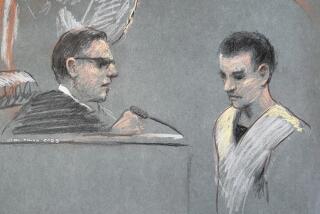Convicted of Aiding Adversaries : S. Africa Major a Spy for Black-Ruled State
- Share via
JOHANNESBURG, South Africa — A 32-year-old major in the South African armed forces, accused of spying for at least one of the country’s black-ruled neighbors, was convicted Tuesday in Pretoria of betraying national secrets.
Maj. Andre Etienne Pienaar, reputedly a key officer in military intelligence at the Voortrekkerhoogte defense headquarters outside Pretoria, was convicted of three charges under the country’s official secrets act after pleading guilty to some counts but innocent to several others. The indictment is still classified.
Although Pienaar was tried in secret and no information has been released officially, local newspapers have reported that he was working for the intelligence services of at least one of the black-ruled nations committed to ending minority white rule in South Africa and that the material he supplied was shared with the outlawed African National Congress.
Major Embarrassment
The case is a major embarrassment to the government because it follows an espionage scandal four years ago, in which Dieter Gerhardt, the commander of the strategic Simon’s Town Naval Base, and his wife, Ruth, were convicted of spying for the Soviet Union for more than 20 years. And it raises questions about the political loyalty of such career officers as Pienaar to the country’s white-led minority government.
The sensitivity of the case was underscored not only by the strict security measures Monday and Tuesday in the provincial Supreme Court in Pretoria but also by the government’s postponement of the trial until after last week’s parliamentary elections and the strict prohibition on publishing any details of the charges or of Pienaar’s background.
Pienaar is expected to be sentenced Thursday after defense pleas for mercy.
That Pienaar is an Afrikaner, a descendant of South Africa’s Dutch, French and German settlers who hold political power here, is “deeply troubling” to top government leaders, according to political sources. President Pieter W. Botha is said to be concerned that “Pienaar’s treachery,” as his undisclosed crime is being described, reflects a greater malaise among the Afrikaners.
Stopped at Airport
Pienaar was arrested last December, according to newspaper accounts that quoted government sources, as he was about to board an airliner at Johannesburg’s Jan Smuts Airport for “an African destination.” These accounts said he carried with him a substantial number of defense and intelligence documents described by the trial judge as “extremely secret things.”
He was held for three months under South African security laws that permit indefinite detention without trial and was later charged with multiple violations of the Protection of Information Act and the Defense Act. At government insistence, the Supreme Court in Pretoria prohibited the news media from publishing details of the charges against Pienaar and from disclosing any personal details about him or his family or printing pictures of them.
At least two people were arrested on espionage charges in the wake of Pienaar’s detention, according to the press reports, but no one else has been charged. The security police and counterintelligence officers told South African newspapers, however, that Pienaar had been caught quickly through procedures established after Gerhardt’s discovery.
Not on Highest Level
While Pienaar caused more damage than other recent spies, the reports said, he was not in the same class as Gerhardt, who betrayed most of the Western naval surveillance techniques for the South Atlantic and who had operated a wide-ranging intelligence network here for at least 20 years.
In addition to the Gerhardt case, Pienaar’s conviction recalled the trials of several other whites found guilty in recent years of supplying information to the African National Congress. One supplied the ANC with a drawing of the country’s nuclear power station near Cape Town, others gathered a wide variety of political and economic information and a few collected intelligence on possible targets for guerrilla attacks or for sabotage.
More to Read
Sign up for Essential California
The most important California stories and recommendations in your inbox every morning.
You may occasionally receive promotional content from the Los Angeles Times.













